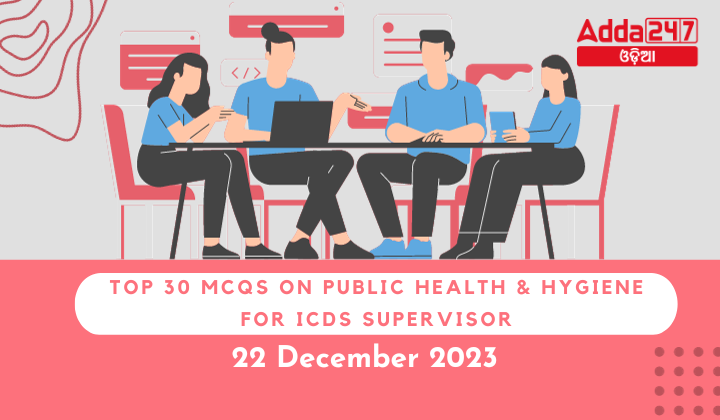Public health and hygiene are critical aspects of community well-being, and for ICDS (Integrated Child Development Services) Supervisors, a solid understanding of these topics is essential. In this article, we present a set of 30 Multiple Choice Questions (MCQs) with answers to help ICDS Supervisors enhance their knowledge in public health and hygiene.
1. Question: What is the primary goal of public health?
- a) Individual well-being
- b) Community well-being
- c) Economic prosperity
- d) Political stability
Answer: b) Community well-being
2. Question: What is the significance of handwashing in preventing diseases?
- a) Aesthetic appeal
- b) Cultural tradition
- c) Disease prevention
- d) Social etiquette
Answer: c) Disease prevention
3. Question: Which of the following is a vector-borne disease?
- a) Diabetes
- b) Malaria
- c) Hypertension
- d) Asthma
Answer: b) Malaria
4. Question: What is the recommended daily water intake per person for maintaining hydration?
- a) 1 liter
- b) 2 liters
- c) 3 liters
- d) 4 liters
Answer: b) 2 liters
5. Question: Which immunization is crucial for preventing cervical cancer?
- a) Measles
- b) Hepatitis B
- c) Influenza
- d) HPV (Human Papillomavirus)
Answer: d) HPV (Human Papillomavirus)
6. Question: What is the main purpose of the ICDS program?
- a) Disease treatment
- b) Child education
- c) Women empowerment
- d) Child development and nutrition
Answer: d) Child development and nutrition
7. Question: Which of the following is a waterborne disease?
- a) Dengue
- b) Cholera
- c) Tuberculosis
- d) Typhoid
Answer: b) Cholera
8. Question: What is the primary role of a nutritionist in public health?
- a) Diagnosing diseases
- b) Designing meal plans
- c) Administering vaccines
- d) Conducting surgeries
Answer: b) Designing meal plans
9. Question: What does the term “Sanitation” refer to in public health?
- a) Personal hygiene
- b) Cleanliness of the environment
- c) Mental well-being
- d) Physical fitness
Answer: b) Cleanliness of the environment
10. Question: Which of the following is NOT a method of family planning?
- a) Condoms
- b) Tubectomy
- c) Antibiotics
- d) Oral contraceptives
Answer: c) Antibiotics
11. Question: What is the primary source of vitamin D for the human body?
- a) Fruits
- b) Vegetables
- c) Sunlight
- d) Meat
Answer: c) Sunlight
12. Question: What is the importance of the “Pulse Polio” campaign?
- a) Controlling heart diseases
- b) Eradicating polio
- c) Promoting vegetarianism
- d) Preventing diabetes
Answer: b) Eradicating polio
13. Question: What is the ideal temperature for storing perishable foods in a refrigerator?
- a) 0°C
- b) 5°C
- c) 10°C
- d) 15°C
Answer: b) 5°C
14. Question: Which organization is responsible for global public health coordination?
- a) WHO (World Health Organization)
- b) UNESCO (United Nations Educational, Scientific and Cultural Organization)
- c) UNICEF (United Nations International Children’s Emergency Fund)
- d) ILO (International Labour Organization)
Answer: a) WHO (World Health Organization)
15. Question: What is the primary cause of air pollution in urban areas?
- a) Industrial emissions
- b) Deforestation
- c) Agricultural practices
- d) Volcanic eruptions
Answer: a) Industrial emissions
16. Question: Which of the following is a non-communicable disease?
- a) Influenza
- b) Tuberculosis
- c) Diabetes
- d) Malaria
Answer: c) Diabetes
17. Question: What is the role of iodine in human nutrition?
- a) Enhancing vision
- b) Strengthening bones
- c) Preventing goiter
- d) Boosting immunity
Answer: c) Preventing goiter
18. Question: What is the primary method of preventing waterborne diseases in a community?
- a) Vaccination
- b) Handwashing
- c) Water purification
- d) Mosquito nets
Answer: c) Water purification
19. Question: What does BMI (Body Mass Index) measure?
- a) Bone density
- b) Muscle strength
- c) Body fatness
- d) Blood pressure
Answer: c) Body fatness
20. Question: What is the recommended age for initiating complementary feeding for infants?
- a) 2 months
- b) 4 months
- c) 6 months
- d) 8 months
Answer: c) 6 months
21. Question: Which of the following is a common symptom of foodborne illness?
- a) Fever
- b) Happiness
- c) Sleepiness
- d) Excitement
Answer: a) Fever
22. Question: How does smoking contribute to public health challenges?
- a) Enhances lung capacity
- b) Reduces stress
- c) Causes respiratory diseases
- d) Improves cognitive function
Answer: c) Causes respiratory diseases
23. Question: What is the primary purpose of a health education program?
- a) Encouraging unhealthy habits
- b) Ignoring preventive measures
- c) Promoting well-being through awareness
- d) Discouraging medical check-ups
Answer: c) Promoting well-being through awareness
24. Question: Which of the following is a common symptom of dehydration?
- a) Excessive sweating
- b) Dark urine
- c) Increased saliva
- d) Cold extremities
Answer: b) Dark urine
25. Question: How does regular exercise contribute to public health?
- a) Increases sedentary lifestyle
- b) Enhances cardiovascular health
- c) Promotes obesity
- d) Weakens immune system
Answer: b) Enhances cardiovascular health
26. Question: What is the primary purpose of the Safe Drinking Water Act?
- a) Promoting water wastage
- b) Ensuring access to clean water
- c) Encouraging pollution
- d) Supporting waterborne diseases
Answer: b) Ensuring access to clean water
27. Question: Which of the following is an example of a zoonotic disease?
- a) Influenza
- b) Malaria
- c) Tuberculosis
- d) Typhoid
Answer: a) Influenza
28. Question: What is the role of the ICDS Supervisor in promoting maternal health?
- a) Administering vaccines
- b) Conducting surgeries
- c) Providing prenatal care and nutrition
- d) Monitoring industrial emissions
Answer: c) Providing prenatal care and nutrition
29. Question: How does stress impact public health?
- a) Improves mental health
- b) Boosts immune system
- c) Contributes to chronic diseases
- d) Enhances sleep quality
Answer: c) Contributes to chronic diseases
30. Question: What is the primary purpose of the National Rural Health Mission (NRHM)?
- a) Urban development
- b) Rural electrification
- c) Promoting health infrastructure in rural areas
- d) Industrial growth
Answer: c) Promoting health infrastructure in rural areas










